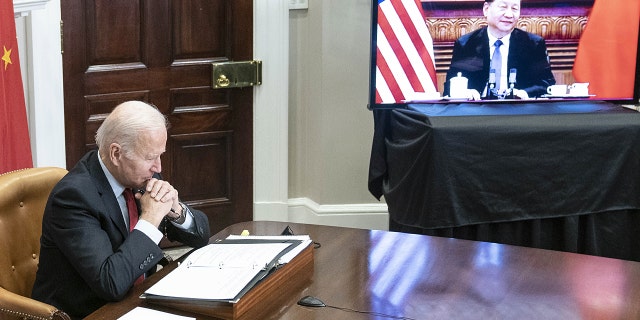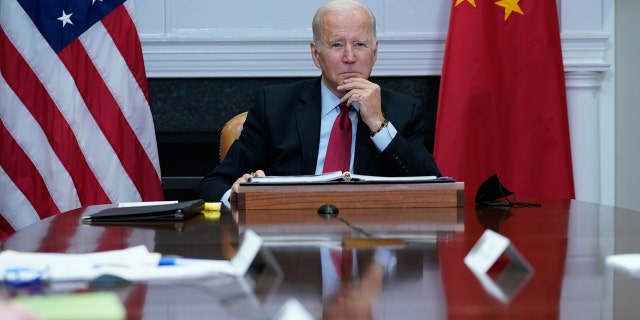by Caitlin McFall
Interpretation differences on one-China policy could mean more trouble in South China Sea
Gen Keane urges US to send message to China that their aggression will be confronted, countered
Former Army Vice Chief of Staff Gen. Jack Keane raises concern toward China’s ‘aggression’ ahead of virtual summit with President Biden.
China claimed Tuesday that President Biden denounced Taiwanese independence from the communist nation, but warned the U.S. is "playing with fire" in the South China Sea.
The new round of threats arose following an hours-long virtual summit between Biden and Chinese President Xi Jinping that marked the most extensive talks the world leaders have engaged in since Biden took office.

President Biden listens while meeting virtually with Xi Jinping, China's president, in the Roosevelt Room of the White House in Washington, D.C., on Monday, Nov. 15, 2021. (Sarah Silbiger/UPI/Bloomberg via Getty Images)
In a read-out following the talks, Chinese officials said Biden reiterated U.S. support for the one-China policy and claimed the U.S. president "does not support ‘Taiwan independence’."
XI CALLS BIDEN 'MY OLD FRIEND' AFTER US PRESIDENT HAD INSISTED THEY WERE NOT CLOSE
Taiwan and China have shared a complex history since the government of the Republic of China (ROC) relocated to the island in the western Pacific in 1949 amid conflict with the Chinese Communist Party (CCP).
Taiwan identifies as a sovereign nation, but it is officially recognized by China, the United Nations and the U.S. as part of the one-China policy.
China made it clear Tuesday that it has every intention of bringing the island under "complete reunification" with mainland China and threatened action if forces attempt to stop this.
"Should the separatist forces for ‘Taiwan independence’ provoke us, force our hands or even cross the red line, we will be compelled to take resolute measures," the readout said. "On this question bearing on China’s sovereignty and territorial integrity, there is no room for compromise."

Chinese Air Force personnel march during 13th China International Aviation and Aerospace Exhibition on Sept. 29, 2021, in Zhuhai in China's Guangdong province. (AP Photo/Ng Han Guan)
The U.S. and its western allies have backed the security of Taiwan and reports have shown the U.S. is working to shore up defenses in the Indo-Pacific as Chinese aggression in the region escalates.
The White House did not contradict China’s claim that the U.S. continues to acknowledge the one-China principle, but the tone was far less placatory.
"President Biden underscored that the United States remains committed to the ‘one-China’ policy, guided by the Taiwan Relations Act, the three Joint Communiques, and the Six Assurances," the White House said in a statement following the talks.
But the statement also said the U.S. "strongly opposes" any move to alter the "status quo" in the region or "undermine peace and stability across the Taiwan Strait."
While both nations have voiced support for the one-China policy, their views of what that means for the region differ.
"The United States and China have two different approaches to the one-China concept," Zack Cooper, senior fellow with the American Enterprise Institute specializing in U.S. strategy in Asia told Fox News. "Beijing advocates its one-China principle, whereas Washington maintains a one-China policy, which is substantially different."

President Biden listens as he meets virtually with Chinese President Xi Jinping at the White House on Monday, Nov. 15, 2021. (AP Photo/Susan Walsh)
Cooper, who served at the Department of Defense and as an assistant on the White House National Security Council during the Bush administration, said this perspective divide could mean the region continues to see geopolitical strife.
"China and the United States maintain two different views of what one-China means and … this issue will be difficult to resolve because neither side is likely to adjust its approach anytime soon," he added.
Biden
and Xi agreed to engage in candid discussions on complex topics facing
both nations but no policy-based solutions appear to have been offered.
Caitlin McFall
Source: https://www.foxnews.com/politics/china-biden-denounced-taiwan-independence-warns-us-playing-fire
No comments:
Post a Comment